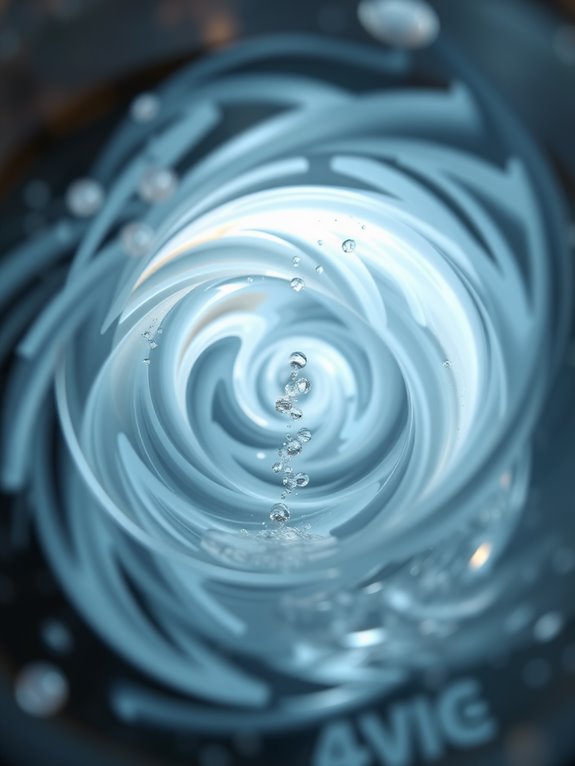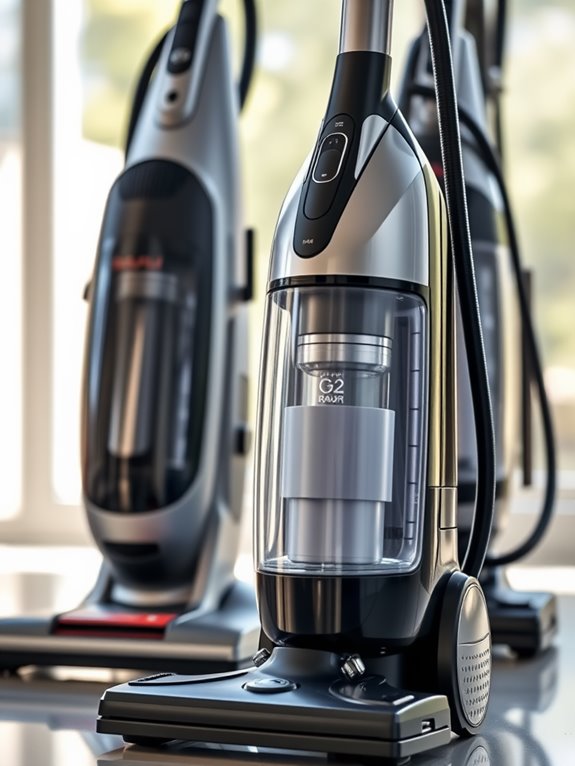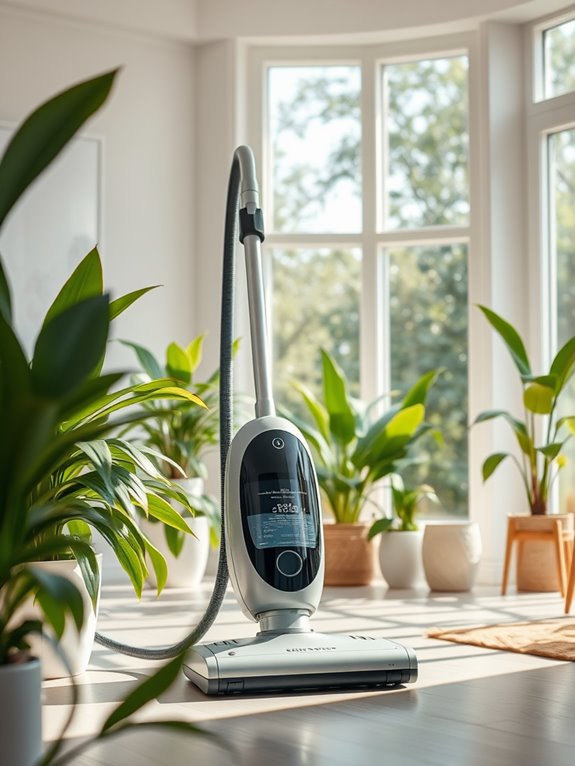Water filtration vacuums are indeed better for your cleaning needs. They trap dirt and allergens in water, preventing them from recirculating in your home. You’ll enjoy enhanced air quality and reduced allergens, making your living space healthier and fresher. Plus, maintenance is simpler compared to traditional models, as you only need to empty the water tank. If you want to explore more features and benefits, there’s plenty more to uncover about these innovative machines.
How Water Filtration Vacuums Work

Water filtration vacuums operate by combining traditional vacuuming methods with a water-based filtration system to trap dirt and debris effectively.
As you vacuum, air and dirt are pulled into the machine, where the water acts as a barrier, capturing particles and preventing them from re-entering the air. The dirt collects in the water, making disposal easy and mess-free.
You’ll notice that allergens and dust are minimized, creating a cleaner environment. The water also helps to keep the vacuum’s filters cleaner, prolonging their lifespan.
See also Airbot Supersonics: The Next Generation Vacuum Cleaner You Need to Know About
Advantages of Water Filtration Technology
When you use a water filtration vacuum, you’ll notice enhanced filtration efficiency that captures more dirt and allergens.
This technology not only reduces allergens in your home but also eliminates unpleasant odors, creating a fresher living space.
You’ll appreciate how these benefits contribute to a healthier environment for you and your family.
Enhanced Filtration Efficiency
While many vacuum cleaners struggle to capture fine dust and allergens, water filtration vacuums excel in providing enhanced filtration efficiency.
These innovative machines trap particles in water, preventing them from re-entering your home’s air. Unlike traditional filters that can clog, water filtration systems maintain consistent suction power.
You’ll notice a significant reduction in dust and debris on surfaces, making your cleaning efforts more effective. Plus, they’re easy to clean; just empty the water tank and rinse it out.
With water filtration vacuums, you can enjoy cleaner air and a healthier living environment, all while simplifying your cleaning routine.
Allergen Reduction Benefits
Not only do water filtration vacuums improve your cleaning routine, but they also greatly reduce allergens in your home. By trapping dust, pollen, and pet dander in water, they prevent these irritants from circulating back into the air. This means you can breathe easier and enjoy a healthier living space.
| Allergen Type | Effectiveness |
|---|---|
| Dust Mites | High |
| Pollen | Very High |
| Pet Dander | Moderate to High |
With fewer allergens around, you’ll notice a significant improvement in your allergies and overall comfort at home.
Odor Elimination Features
Using water filtration technology in vacuums does more than just trap allergens; it also effectively eliminates unpleasant odors from your home.
The water acts as a natural deodorizer, capturing and neutralizing odors while you clean. Unlike traditional vacuums that may release dust and smells back into the air, water filtration vacuums keep everything contained.
This means you can breathe easier and enjoy a fresher living environment. Plus, they’re particularly helpful for pet owners and anyone dealing with stubborn smells.
With a water filtration vacuum, you’re not just cleaning; you’re enhancing your home’s atmosphere too.
See also Water Treatment and Its Importance: A Comprehensive Guide
Comparing Water Filtration Vacuums to Traditional Models

When you compare water filtration vacuums to traditional models, you’ll notice significant differences in their cleaning capabilities and efficiency.
Water filtration vacuums utilize water to trap dirt and allergens, preventing them from recirculating into the air. Traditional vacuums rely on bags or filters, which can release particles back into your environment.
You’ll find water filtration vacuums often provide deeper cleaning, especially on carpets, as they can handle various debris types more effectively.
Additionally, maintenance is typically easier with water filtration models since you only need to empty the water tank, while traditional models require changing bags or filters regularly.
Health Benefits of Using Water Filtration Vacuums
Using water filtration vacuums can considerably reduce allergens in your home, making it a healthier environment for you and your family.
These vacuums trap dust, pet dander, and other particles, leading to improved indoor air quality.
You’ll notice the difference in how you breathe and feel in your space.
Allergen Reduction Benefits
While many vacuum cleaners merely circulate allergens back into the air, water filtration vacuums excel at trapping dust, pet dander, and other irritants within their water tank. This means you’re not just cleaning your floors; you’re greatly reducing allergy symptoms for yourself and your family.
| Allergen Type | Water Filtration Effectiveness | Traditional Vacuum Effectiveness |
|---|---|---|
| Dust Mites | High | Low |
| Pet Dander | High | Medium |
| Pollen | High | Medium |
| Mold Spores | High | Low |
Using a water filtration vacuum can help keep your home healthier.
See also Alum in Water Treatment: What It Does and How to Use It Safely
Improved Indoor Air Quality
Air quality in your home greatly improves with the use of water filtration vacuums.
These vacuums trap dust, allergens, and pollutants in water, preventing them from being released back into the air. Unlike traditional vacuums that can stir up debris, water filtration vacuums guarantee that harmful particles stay contained.
You’ll notice fewer respiratory issues, less allergy flare-ups, and a fresher atmosphere overall. By regularly using one, you not only clean your floors but also enhance the air you breathe.
Investing in a water filtration vacuum means prioritizing your health and creating a safer living space for you and your family.
Environmental Impact of Water Filtration Vacuums

Although many people appreciate the cleaning power of water filtration vacuums, their environmental impact deserves careful consideration. These vacuums often rely on electricity, contributing to carbon emissions. Additionally, the water used can strain local water resources. It’s crucial to weigh these factors against the benefits.
| Factor | Positive Impact | Negative Impact |
|---|---|---|
| Energy Consumption | Efficient models available | Increased carbon footprint |
| Water Usage | Effective dirt removal | Strains water resources |
| Waste Management | Reduces landfill waste | Potential water pollution |
Keeping these aspects in mind helps you make informed choices.
Key Features to Consider When Choosing a Water Filtration Vacuum
When selecting a water filtration vacuum, it’s important to focus on features that enhance both performance and efficiency.
Look for a powerful motor that provides strong suction to tackle dirt and debris effectively. Consider the tank capacity; a larger tank means fewer trips to empty it.
Check the filtration system—multi-stage filters can trap finer particles, improving air quality. Don’t overlook attachments; specialized tools can help clean various surfaces.
Finally, assess the vacuum’s ease of use, including weight and maneuverability. Choosing a model with these key features guarantees you get the best cleaning experience possible.
Conclusion
In the end, water filtration vacuums aren’t just a trendy choice; they’re a smart investment for your home and health. Imagine breathing easier, knowing you’re capturing dust and allergens in a cleaner, more efficient way. By choosing this innovative technology, you’re not only enhancing your indoor air quality but also making a positive impact on the environment. So, why settle for traditional models when a water filtration vacuum can elevate your cleaning game?

I’m Allen Kim, the chief editor of plumbinginto. I am a mid level plumber and assign to an local firm over 4 years of experience. During the working period, most of my experience is related to the house plumbing. I learned about the thing, when working with most experienced people in this sector, one must be as good as the inspector or better with knowledge of the project as well as the practical aspects of plumbing industry.